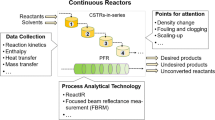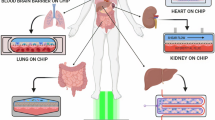Abstract
Modern bioprocess development includes extensive screening tasks, but many tools tackling the resulting combinatorial explosion do not provide production scale relevant conditions. Thus, novel technologies are needed for scalable data acquisition via incorporation of miniaturization, automation and digitalization. The Microbial Bioprocess Lab–a Helmholtz Innovation Lab strives at designing such disruptive technologies and to catalyze their translation from science into industrial application.
Similar content being viewed by others
Literatur
Doig SD, Baganz F, Lye GJ (2006) High-throughput screening and process optimisation. In: Ratledge C, Kristiansen B (Hrsg) Basic Biotechnology. Cambridge University Press, Cambridge
Schallmey M, Frunzke J, Eggeling L et al. (2014) Looking for the pick of the bunch: high-throughput screening of producing microorganisms with biosensors. Curr Opin Biotech 26:148–154
Binder S, Schendzielorz G, Stäbler N et al. (2012) A high-throughput approach to identify genomic variants of bacterial metabolite producers at the single-cell level. Genome Biol 13:R40
Freier L, Hemmerich J, Schöler K et al. (2016) Framework for Kriging-based iterative experimental analysis and design: optimization of secretory protein production in Corynebacterium glutamicum. Eng Life Sci, 16:538–549
Morschett H, Freier L, Rohde J et al. (2017) A framework for accelerated phototrophic bioprocess development: integration of parallelized microscale cultivation, laboratory automation and Kriging-assisted experimental design. Biotechnol Biofuels 10:26
Rohe P, Venkanna D, Kleine B et al. (2012) An automated workflow for enhancing microbial bioprocess optimization on a novel microbioreactor platform. Microb Cell Fact 11:144
Hemmerich J, Rohe P, Kleine B et al. (2016) Use of a Sec signal peptide library from Bacillus subtilis for the optimization of cutinase secretion in Corynebacterium glutamicum. Microb Cell Fact 15:208
Unthan S, Radek A, Wiechert W et al. (2015) Bioprocess automation on a Mini Pilot Plant enables fast quantitative microbial phenotyping. Microb Cell Fact 14:32
Koepff J, Keller M, Tsolis KC et al. (2017) Fast and reliable strain characterization of Streptomyces lividans through micro-scale cultivation. Biotechnol Bioeng 114:2011–2022
Radek A, Tenhaef N, Müller MF et al. (2017) Miniaturized and automated adaptive laboratory evolution: evolving Corynebacterium glutamicum towards an improved D-xylose utilization. Bioresour Technol, doi: 10.1016/j.biortech.2017.05.055
Author information
Authors and Affiliations
Corresponding author
Additional information
Holger Morschett Master in Molekularer und Angewandter Biotechnologie an der RWTH Aachen. 2017 Promotion an RWTH Aachen/ Forschungszentrum Jülich. Seit 2016 Postdoc am Institut für Bio- und Geowissenschaften (IBG-1: Biotechnologie) des Forschungszentrum Jülich und operativer Laborleiter des Microbial Bioprocess Lab–Ein Helmholtz Innovation Lab.
Stephan Noack Diplom der Bioverfahrenstechnik an der TU Dresden. 2007 Karl-Schügerl-Forschungspreis der Biotechnologie. 2009 Promotion an der Universität Siegen. Seit 2011 Leiter der Nachwuchsgruppe „Quantitative Microbial Phenotyping“ am IBG-1:Biotechnologie des Forschungszentrum Jülich. 2014 Gastwissenschaftler am Novo Nordisk Foundation Center for Biosustainability in Dänemark.
Marco Oldiges Diplom in Chemie mit Schwerpunkt Technische Chemie an der Universität Bonn. 2004 Promotion an Universität Bonn/ Forschungszentrum Jülich. Seit 2005 Leitung der Arbeitsgruppe „Bioprozesse und Bioanalytik“ am IBG-1: Biotechnologie des Forschungszentrum Jülich. 2007 Hochschullehrernachwuchspreis der Dechema. Seit 2011 vertritt er auch das Lehr- und Forschungsgebiet Bioprozess-Analytik an der RWTH Aachen.
Rights and permissions
About this article
Cite this article
Morschett, H., Noack, S. & Oldiges, M. Beschleunigte Bioprozessentwicklung im automatisierten Mikromaßstab. Biospektrum 23, 536–539 (2017). https://doi.org/10.1007/s12268-017-0838-9
Published:
Issue Date:
DOI: https://doi.org/10.1007/s12268-017-0838-9




